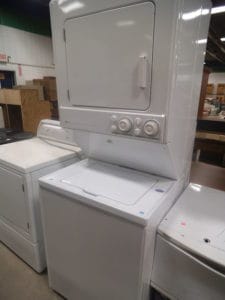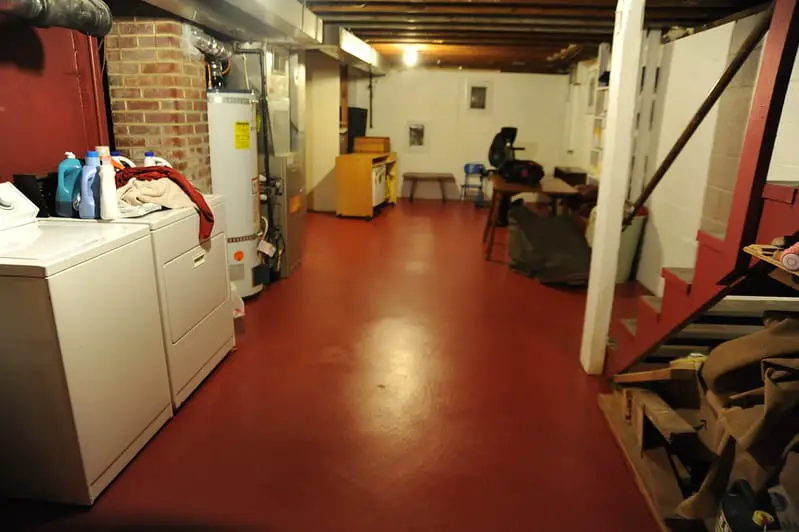You probably did some extensive remodeling in your home and ended up placing the three essential appliances – the washer, dryer, and water heater – in the same place.
Or you are probably wondering whether it would be great to place them together in one place in your new plans.
Whatever you have on the drawing board, the mere thought of having these three close to each other raises some questions.
One of the appliances may malfunction.
Also, you can’t be very sure you will get the most out of each appliance when they are so close.
Somewhere in the manual of any of these appliances, you might come across a line or two discouraging this idea, or a guide leading you through the best process method of installation close to other similar equipment.
But, Can A Washer And Dryer Be Next To A Water Heater?
In most cases, no. Unless the manufacturers of these appliances are okay with that idea, or you’re really good with these sorts of appliances, it wouldn’t be particularly great to have them in one place. There are several reasons for that.
Three Reasons Why The Washer & Dryer SHOULD NEVER BE NEXT TO THE Water Heater
1. “SUFFOCATION” – Your Dryer Could Be Deprived Of Air
Ask anyone with all these three appliances in one place and they’ll tell you the first problem they encountered: a water heater that keeps turning off in the middle of operation!
If you call the manufacturer with such a problem, one of the first questions they normally ask is whether you installed their appliance in one room with other common air-hungry household equipment.
If your answer ends up as “yes”, the customer care is more likely to point this arrangement as the problem.
Here is what normally happens when you install your water heater and dryer close to each other (let’s leave out the washer for now): the water heater is normally air-hungrier than the dryer.
Remember that, in addition to venting, propane and gas water heaters need a sufficient air supply for combustion purposes.
This air may be obtained from the surrounding atmospheric air in your home, or through the vent pipe designed to pull air from outdoors.
If the water heater is designed to obtain air from indoors, it will collect a lot of it via the screen and eventually “suffocate” the nearby dryer and any other close appliance that may require air to operate properly.
This normally ends up in two scenarios –
- Firstly, if both the water heater and dryer are running but the heater manages to suck more than the dryer, the dryer will shut down to prevent damages.
- Secondly, if the dryer is good at sucking more air than the heater, the heater may shut down or get incredibly hot. In most cases, however, either appliance simply shuts off as more manufacturers are keen to incorporate safety features in their equipment to boost their lifespan.
2. Problem with exhaust gases
Closely packed dryer and gas/propane-powered water heater may have hardship with disposal of the exhaust gases.
In fact, poorly disposed exhaust air is the second biggest cause of heater and/or dryer malfunction if these two are allowed to run close to each other.
If these appliances aren’t ducted properly to release the exhaust gases to the outdoors, the gases may accumulate in the environment, eventually creating a blanket of hot air around the appliances.
One appliance can draw the hot air backward via the flu or both.
Either way, the hot exhaust gases will reenter the dryer or water heater or both, potentially causing carbon monoxide (CO) problems in your house.
Besides the killer CO gas, you will also need to cope with a poorly ventilated appliance that can’t get plenty of cold air to cool the innards.
3. Servicing difficulties
How next is our “next”? The shortest (and healthiest) clearance you could leave between these appliances is about 1 meter.
This is still close but can depend on the size of your room.
Bringing them too close to each other can make the repair and maintenance work to be extremely difficult. So, even if it is permitted by code, it’s not advisable.
Two Reasons Why You CAN Position A Water Heater Next To A Washer Dryer Set
However, you CAN install these appliances close to each other if:
1. The home is well insulated
Yes, whether you should keep the washer, dryer, and water heater close together or not can depend on how well your house is sealed and insulated.
A tightly sealed home can be a serious problem with these appliances.
Some older homes leak like sieves, all to the detriment of the proper functioning of the equipment, especially the dryer and gas/propane-powered water heater.
We would strongly recommend that you add the carbon monoxide detector in the installation area, to keep you informed when too much carbon monoxide accumulates around the appliances.
CO isn’t a gas you’d wish to breathe. Neither is it so great for your appliances.
Can you set up your dryer in such a way that it utilizes an external source of air (drawing air from outdoors, that is)?
If yes, then you can install it near your water heater without worries because there will be no competition for fresh air. Otherwise, you better install them away from each other.
2. They are stackable

If you can stack any two of these appliances, you can avoid pretty much any problem.
Consider adding buying a stackable dryer and washer and stacking them in a utility closet that holds your gas/propane-powered water heater.
You actually can stack all three with the washer at the bottom although this may make it a bit hard to use the topmost appliance, so two would be great.
If the room is about 4 ft. by 5 ft. complete with a door equipped with a vent, you can opt to stack any two appliances then install the third a short distance nearby.
Stacking has the advantage of increasing the surface area for “breathing” vertically.
Your local plumber has all the expertise needed to put the dryer/washer/heater in the closet the right way.
If things go awry, you will still have problems with combustion and draft from your dryer.
This can also depend on whether you choose a gas or electric dryer – the electric option is always advantageous because it doesn’t produce toxic exhaust gases.
Related: Can You Put a Washing Machine Next to an Oven (Or Range)?
Summary
Can a washer and dryer be next to a water heater?
No, but it can depend on how you choose to position them near each other among other factors.
- The biggest challenge that comes with a dryer, washer, and water heater installed close to each other is the deprivation of fresh cooling.
- Note that the water heater is normally air-hungrier than the dryer. Remember that, in addition to venting, propane and gas water heaters need a sufficient air supply for combustion purposes.
- The air may be obtained from the surrounding atmospheric air in your home, or through the vent pipe designed to pull air from outdoors.
- If the water heater is designed to obtain air from indoors, it will collect a lot of it via the screen and eventually “suffocate” the nearby dryer and any other close appliance that may require air to operate properly.
- One of two situations usually ensue – firstly, if both the water heater and dryer are running but the heater manages to suck more than the dryer, the dryer with shut down to prevent damages.
- Secondly, if the dryer is good at sucking more air than the heater, the heater may shut down or get incredibly hot. In most cases, however, either appliance simply shuts off as more manufacturers are keen to incorporate safety features in their equipment to boost their lifespan.
- Closely packed dryer and gas/propane-powered water heater may have hardship with disposal of the exhaust gases
- Poorly disposed exhaust air is the second biggest cause of heater and/or dryer malfunction if these two are allowed to run close to each other
- If these appliances aren’t ducted properly to release the exhaust gases to the outdoors, the gases may accumulate in the environment, eventually creating a blanket of hot air around the appliances.
- One appliance can draw the hot air backward via the flue or both. Either way, the hot exhaust gases will reenter the dryer or water heater or both, potentially causing carbon monoxide (CO) problems in your house.
- Besides the toxic CO gas, you will also need to cope with a poorly ventilated appliance that can’t get plenty of cold air to cool the innards.
- Another reason why you shouldn’t install these appliances close to each other is the servicing hardship this arrangement could pose in the future.

